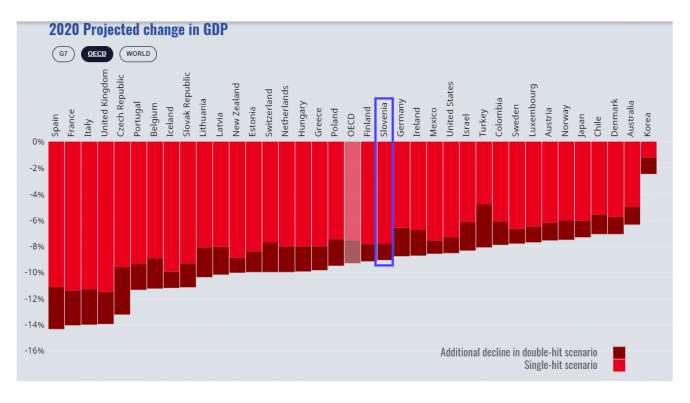STA, 10 June 2020 - The Organisation for Economic Co-operation and Development (OECD) says in its latest forecast for Slovenia that the country's gross domestic product (GDP) is expected to shrink this year by 7.8% this year, or as much as 9.1% in the event of a second wave of coronavirus infections.
For 2021, the OECD expects that Slovenia's economy will grow by 4.5%, or by 1.5% in the event of another Covid-19 outbreak, the organisation says in the forecast published on Wednesday.
It says that the Covid-19 epidemic in Slovenia has manifested itself in a "historically large drop in consumer confidence and business sentiment, which only recently have begun to recover."
The OECD notes that the tourism sector is the worst affected, and also hard hit is road transport, although activity of the latter has started to recover.
For this and other related reasons, the OECD estimates that the output loss in the first half of 2020 will be at 13% year-on-year.
The unemployment rate is expected to reach 6.4% this year, or 6.9% in the adverse scenario, and next year to stand at 5.4% or 8.1%, respectively.
"To avoid higher long-term unemployment, it is important that active labour market policies focus on the hard-to-employ job-seekers by providing adequate job search support and skills upgrading," the report for Slovenia says.
Measured with the harmonised index of consumer prices, the inflation rate for this year is expected to stand at 1% under both scenarios, and at 2% or 1.7%, respectively, next year.
The OECD says that the Slovenian government has adopted a number of fiscal measures amounting to almost 4.5% of the country's GDP, but notes that additional measures should be taken to secure long-term sustainability of the economy.
In addition to the prevention of long-term unemployment, the measures include avoiding a "further increase in the already relatively high share of state-owned enterprises, which are present across all sectors."
As for a potential second wave, the OECD says that, a more selective approach to economic relief and support should be applied to allow more businesses to remain open and this should be combined with protection of vulnerable groups.
The report also touches on the Slovenian healthcare system, saying that while its efficiency compares favourably with peers, structural problems in the sector raise concerns about inefficiencies in cost, quality and safety.
The OECD notes "the low and uneven density of GPs" and "the relatively low ratio of intensive care beds to population", which may raise capacity concerns if the pandemic comes back in a more virulent form.
You can explore the OECD data here







